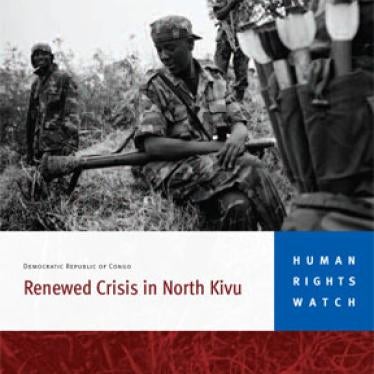(Brussels) - All sides to the renewed fighting in the eastern part of the Democratic Republic of Congo must protect civilians at risk, Human Rights Watch said today. Human Rights Watch also called on United Nations peacekeepers in the area to strengthen their civilian protection efforts.
In the eastern province of North Kivu, the Congolese army last week launched a major military offensive against dissident soldiers loyal to renegade general Laurent Nkunda. Government troops advanced close to the town of Kirolirwe, one of Nkunda’s strongholds in Masisi territory, some 35 kilometers northwest of the provincial capital of Goma. According to UN figures, Kirolirwe harbors an estimated 45,000 civilians, the majority of whom are ethnic Tutsi.
Nkunda, himself a Tutsi, says he is fighting to protect the Tutsi population against ethnically motivated attacks from other Congolese groups and from a Rwandan opposition force called the Forces for the Liberation of Rwanda (Forces démocratiques de la libération du Rwanda, FDLR), some of whose leaders participated in the anti-Tutsi genocide in Rwanda in 1994.
In recent days Nkunda’s troops put up stiff resistance and, at latest report, had driven government troops back from earlier gains to positions near the town of Sake, location of many previous battles.
“Under the laws of war, government and rebel forces alike must protect civilians during military operations,” said Anneke Van Woudenberg, senior Congo researcher at Human Rights Watch. “But almost every time these belligerents have fought each other, they have killed, raped and looted civilians. These abuses must stop.”
On December 7, provincial authorities and military officials urged Kirolirwe residents to flee to zones under government control, but they failed to provide information on evacuation arrangements or ensure that the humanitarian needs of the displaced civilians would be met. On Sunday, a UN humanitarian mission visited Kirolirwe to examine possible alternatives, but to date no solution has been found.
The laws of war call on all parties to a conflict to give effective advance warning of attacks that affect the civilian population. Warring parties must take all feasible precautions to minimize harm to civilians, and they must protect civilians under their control against the effects of attacks. They must allow and facilitate humanitarian aid for civilians in need.
Civilians, many of whom have already fled hostilities in their home areas to the south, fear that if they flee Kirolirwe protected by Nkunda’s forces, they and their livestock will be attacked by a militia called the Coalition of Congolese Patriotic Resistance (Patriotes résistants du Congo, PARECO) or by the FDLR. Both PARECO and FDLR combatants are said to have joined recent operations by Congolese government troops against Nkunda’s forces.
Away from the frontlines, armed groups continue to prey on the local population with impunity. A hospital in Masisi reported daily arrivals of civilians who have been the victims of violent attacks, including women and girls who have been raped. Near Chamarambo, for example, a 13-year-old girl was gang raped at gun point by three combatants she identified as part of PARECO. In the same area, three women were raped and then shot, one fatally. Near Mianja, a man was shot in both legs by unidentified armed men for refusing to hand over a goat.
All parties to the conflict in North Kivu – including the Congolese army, troops under the command of Nkunda, and combatants from the FDLR and PARECO – have committed serious crimes against civilians, including killings, rape, forced displacement, looting and the use of child soldiers. In a detailed report published in October, Human Rights Watch documented abuses against civilians during 18 months of armed conflict.
The recent combat has increased local hostility against the Congolese Tutsi population, seen by other groups as the main supporters of Nkunda. But Tutsi civilians have also suffered displacement and abuse, including from those who claim to be protecting them.
Since late 2006, the conflict in North Kivu has displaced some 400,000 persons, adding to the burden on humanitarian agencies already trying to assist hundreds of thousands of others displaced by earlier stages of the fighting. In recent weeks, the growing insecurity and heavy rains have made it more difficult for humanitarian agencies to deliver assistance and have slowed commercial traffic between population centers in Masisi and Rutshuru territories, driving up prices and further increasing vulnerability.
UN peacekeepers have a mobile base in Kirolirwe in addition to bases in other locations in North Kivu and say they will remain as long as civilians are at risk. There are currently more than 17,000 UN peacekeeping troops in Congo, with some 4,500 based in North Kivu. Their mandate includes protecting civilians, including by the use of armed force if necessary. In the recent past, UN troops have pulled out of combat areas in North Kivu when they believed their own lives were at risk.
This week, UN Security Council members in New York will begin discussing the renewal of the mandate of the UN mission in Congo, known as MONUC (Mission de l’ONU en RD Congo). The mandate is due to expire on December 31.
“Security Council members must ensure the blue helmets in Congo have a strong mandate to protect vulnerable civilians and the means to carry it through,” said Van Woudenberg. “Those who have suffered so much in these years of war must not be abandoned when the fighting draws near.”







